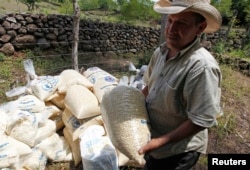Worry over having enough food is forcing people from drought-stricken Central America to migrate north to the United States, leaving families behind who grow more vulnerable to poverty, said an international report released Wednesday.
Honduras, El Salvador and Guatemala must address hunger-related migration by adapting agricultural practices to deal with increased water shortages and help communities be prepared for crises, said the report compiled by several global aid groups.
Roughly half the families surveyed in the three countries, dogged by drought, crop losses and reduced agricultural productivity, face so-called food insecurity, when supplies are limited or uncertain, it said.
More than half the households spent more than two-thirds of their wages on food, and about a third live in extreme poverty, it said.
"These levels of food insecurity have not been previously seen in the region," said the report, which listed high unemployment and low wages among the main reasons for migration from Central America.
The so-called "Dry Corridor" running through Guatemala, El Salvador, Honduras and Nicaragua is considered vulnerable to extreme weather exacerbated by climate change.
Two consecutive years of drought from 2015 to mid-2016, linked to a powerful El Nino weather phenomenon, decimated crop harvests.
Countries looking to cut migration could implement greater climate surveillance and target hard-hit areas with irrigation schemes and weather insurance, it said.
They also must help protect families whose relatives may have recently emigrated, it said.
"Overall, emigration reduces the available workforce and if not offset by remittances, typically results in increased food insecurity and deepening of poverty," it said.
It also suggested countries improve market access for small-scale farmers.
The report was compiled by the World Food Program, Organization of American States, Inter-American Development Bank, International Fund for Agricultural Development and the International Organization for Migration.
It said more than 400,000 undocumented migrants were detained in fiscal 2016 along the southwestern U.S. border, with a 50 percent rise from the previous year in unaccompanied children.






